Catholic Social Thought Principles in Nursing Assignment Analysis
VerifiedAdded on 2023/06/08
|6
|1359
|484
Essay
AI Summary
This nursing assignment delves into the principles of Catholic Social Thought, focusing on the common good, promotion of peace, and global solidarity. It explains how the principle of the common good emphasizes treating everyone with consideration, especially the less fortunate, and highlights its importance for both individual character and community cohesion. The assignment further discusses how Catholic teachings advocate for peace, defining it as more than just the absence of war but also as mutual respect and collaboration between people and nations, viewing it as a fruit of justice. Lastly, it explores global solidarity, emphasizing the interconnectedness of humanity and the need for cooperation across cultural, social, and political divides, illustrating its significance for individual development and community unity. The essay concludes that these principles foster a sense of belonging for individuals and promote unity within communities.

ursing assignmentN
Principles of catholic social thoughts
Name
Professor
Course
Date
Principles of catholic social thoughts
Name
Professor
Course
Date
Paraphrase This Document
Need a fresh take? Get an instant paraphrase of this document with our AI Paraphraser
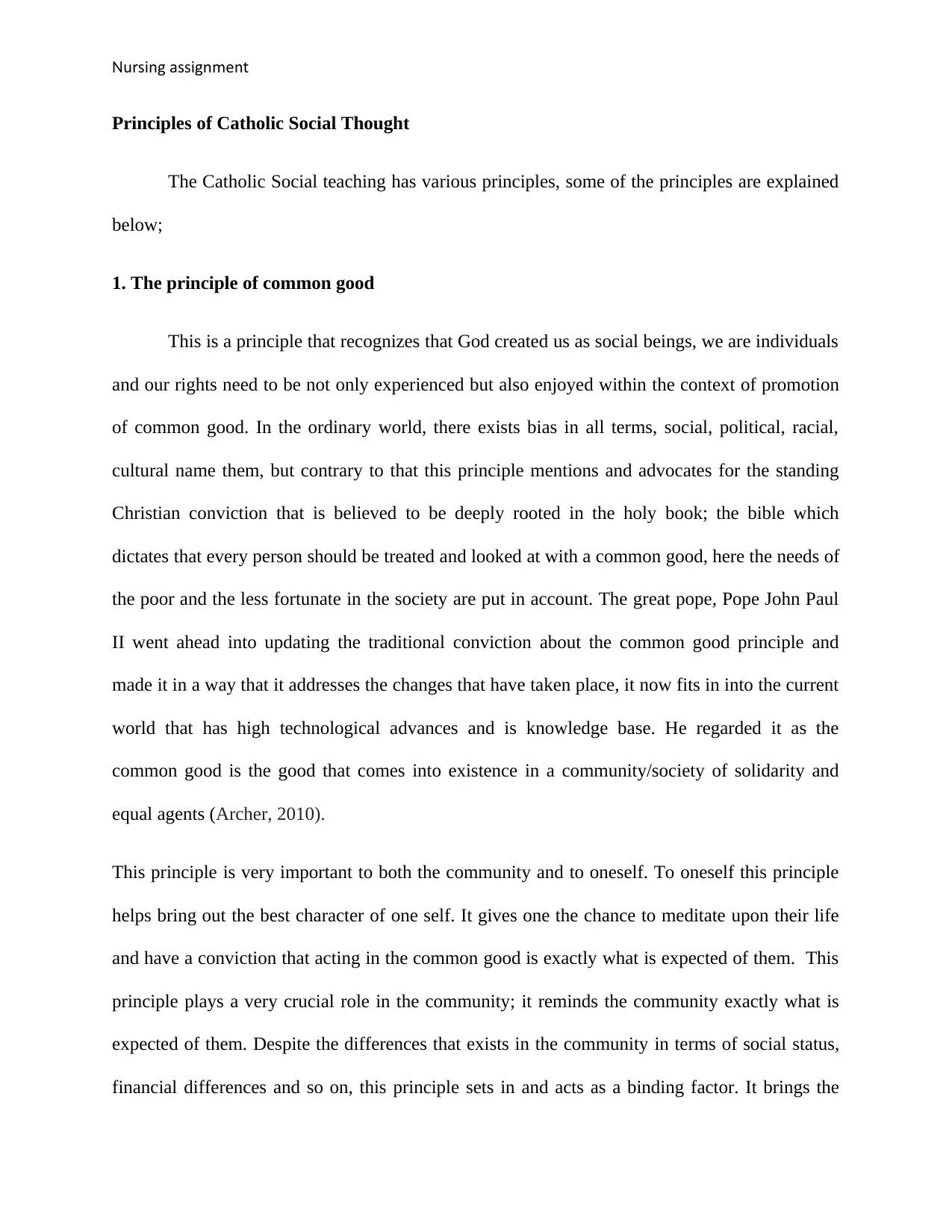
ursing assignmentN
Principles of Catholic Social Thought
The Catholic Social teaching has various principles, some of the principles are explained
below;
1. The principle of common good
This is a principle that recognizes that God created us as social beings, we are individuals
and our rights need to be not only experienced but also enjoyed within the context of promotion
of common good. In the ordinary world, there exists bias in all terms, social, political, racial,
cultural name them, but contrary to that this principle mentions and advocates for the standing
Christian conviction that is believed to be deeply rooted in the holy book; the bible which
dictates that every person should be treated and looked at with a common good, here the needs of
the poor and the less fortunate in the society are put in account. The great pope, Pope John Paul
II went ahead into updating the traditional conviction about the common good principle and
made it in a way that it addresses the changes that have taken place, it now fits in into the current
world that has high technological advances and is knowledge base. He regarded it as the
common good is the good that comes into existence in a community/society of solidarity and
equal agents (Archer, 2010).
This principle is very important to both the community and to oneself. To oneself this principle
helps bring out the best character of one self. It gives one the chance to meditate upon their life
and have a conviction that acting in the common good is exactly what is expected of them. This
principle plays a very crucial role in the community; it reminds the community exactly what is
expected of them. Despite the differences that exists in the community in terms of social status,
financial differences and so on, this principle sets in and acts as a binding factor. It brings the
Principles of Catholic Social Thought
The Catholic Social teaching has various principles, some of the principles are explained
below;
1. The principle of common good
This is a principle that recognizes that God created us as social beings, we are individuals
and our rights need to be not only experienced but also enjoyed within the context of promotion
of common good. In the ordinary world, there exists bias in all terms, social, political, racial,
cultural name them, but contrary to that this principle mentions and advocates for the standing
Christian conviction that is believed to be deeply rooted in the holy book; the bible which
dictates that every person should be treated and looked at with a common good, here the needs of
the poor and the less fortunate in the society are put in account. The great pope, Pope John Paul
II went ahead into updating the traditional conviction about the common good principle and
made it in a way that it addresses the changes that have taken place, it now fits in into the current
world that has high technological advances and is knowledge base. He regarded it as the
common good is the good that comes into existence in a community/society of solidarity and
equal agents (Archer, 2010).
This principle is very important to both the community and to oneself. To oneself this principle
helps bring out the best character of one self. It gives one the chance to meditate upon their life
and have a conviction that acting in the common good is exactly what is expected of them. This
principle plays a very crucial role in the community; it reminds the community exactly what is
expected of them. Despite the differences that exists in the community in terms of social status,
financial differences and so on, this principle sets in and acts as a binding factor. It brings the
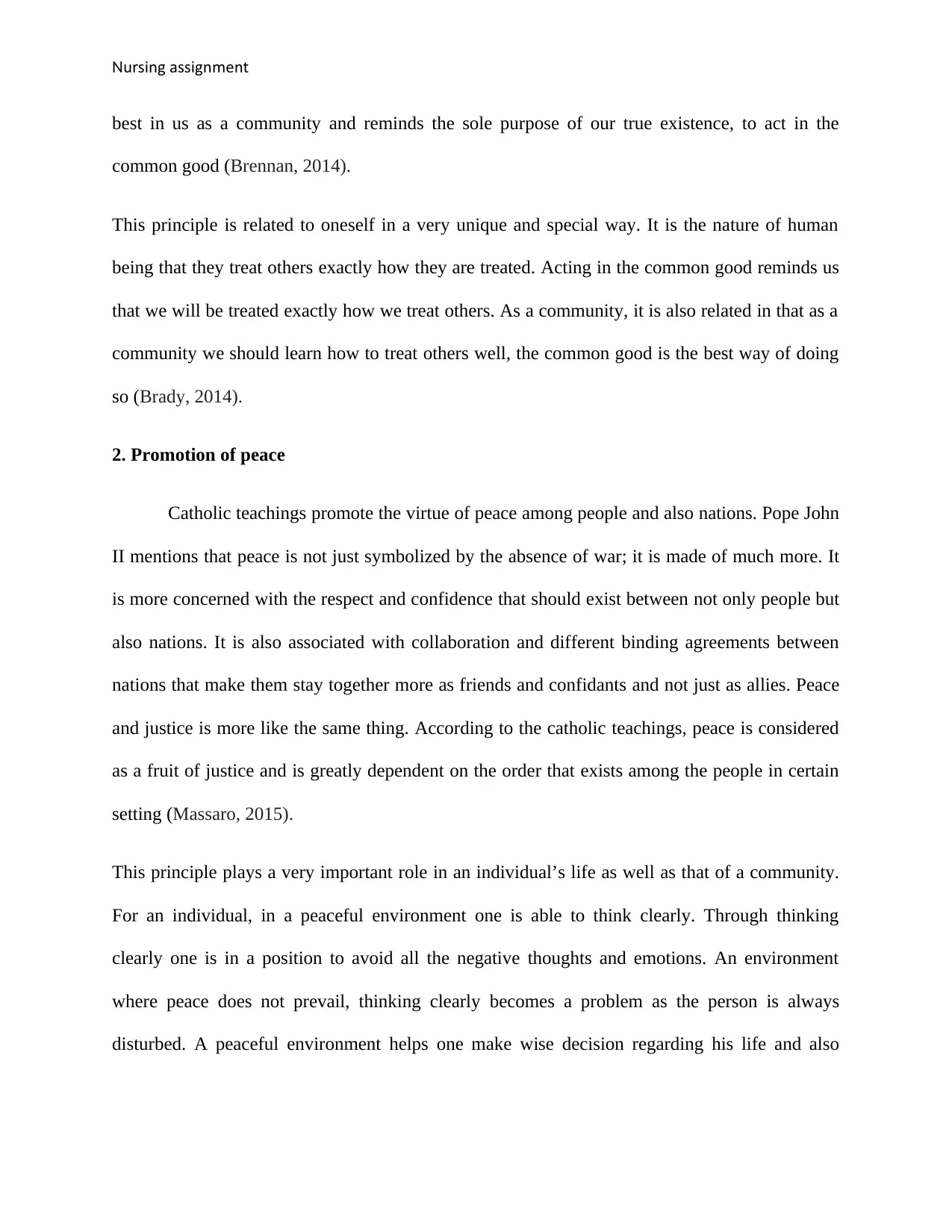
ursing assignmentN
best in us as a community and reminds the sole purpose of our true existence, to act in the
common good (Brennan, 2014).
This principle is related to oneself in a very unique and special way. It is the nature of human
being that they treat others exactly how they are treated. Acting in the common good reminds us
that we will be treated exactly how we treat others. As a community, it is also related in that as a
community we should learn how to treat others well, the common good is the best way of doing
so (Brady, 2014).
2. Promotion of peace
Catholic teachings promote the virtue of peace among people and also nations. Pope John
II mentions that peace is not just symbolized by the absence of war; it is made of much more. It
is more concerned with the respect and confidence that should exist between not only people but
also nations. It is also associated with collaboration and different binding agreements between
nations that make them stay together more as friends and confidants and not just as allies. Peace
and justice is more like the same thing. According to the catholic teachings, peace is considered
as a fruit of justice and is greatly dependent on the order that exists among the people in certain
setting (Massaro, 2015).
This principle plays a very important role in an individual’s life as well as that of a community.
For an individual, in a peaceful environment one is able to think clearly. Through thinking
clearly one is in a position to avoid all the negative thoughts and emotions. An environment
where peace does not prevail, thinking clearly becomes a problem as the person is always
disturbed. A peaceful environment helps one make wise decision regarding his life and also
best in us as a community and reminds the sole purpose of our true existence, to act in the
common good (Brennan, 2014).
This principle is related to oneself in a very unique and special way. It is the nature of human
being that they treat others exactly how they are treated. Acting in the common good reminds us
that we will be treated exactly how we treat others. As a community, it is also related in that as a
community we should learn how to treat others well, the common good is the best way of doing
so (Brady, 2014).
2. Promotion of peace
Catholic teachings promote the virtue of peace among people and also nations. Pope John
II mentions that peace is not just symbolized by the absence of war; it is made of much more. It
is more concerned with the respect and confidence that should exist between not only people but
also nations. It is also associated with collaboration and different binding agreements between
nations that make them stay together more as friends and confidants and not just as allies. Peace
and justice is more like the same thing. According to the catholic teachings, peace is considered
as a fruit of justice and is greatly dependent on the order that exists among the people in certain
setting (Massaro, 2015).
This principle plays a very important role in an individual’s life as well as that of a community.
For an individual, in a peaceful environment one is able to think clearly. Through thinking
clearly one is in a position to avoid all the negative thoughts and emotions. An environment
where peace does not prevail, thinking clearly becomes a problem as the person is always
disturbed. A peaceful environment helps one make wise decision regarding his life and also
⊘ This is a preview!⊘
Do you want full access?
Subscribe today to unlock all pages.

Trusted by 1+ million students worldwide
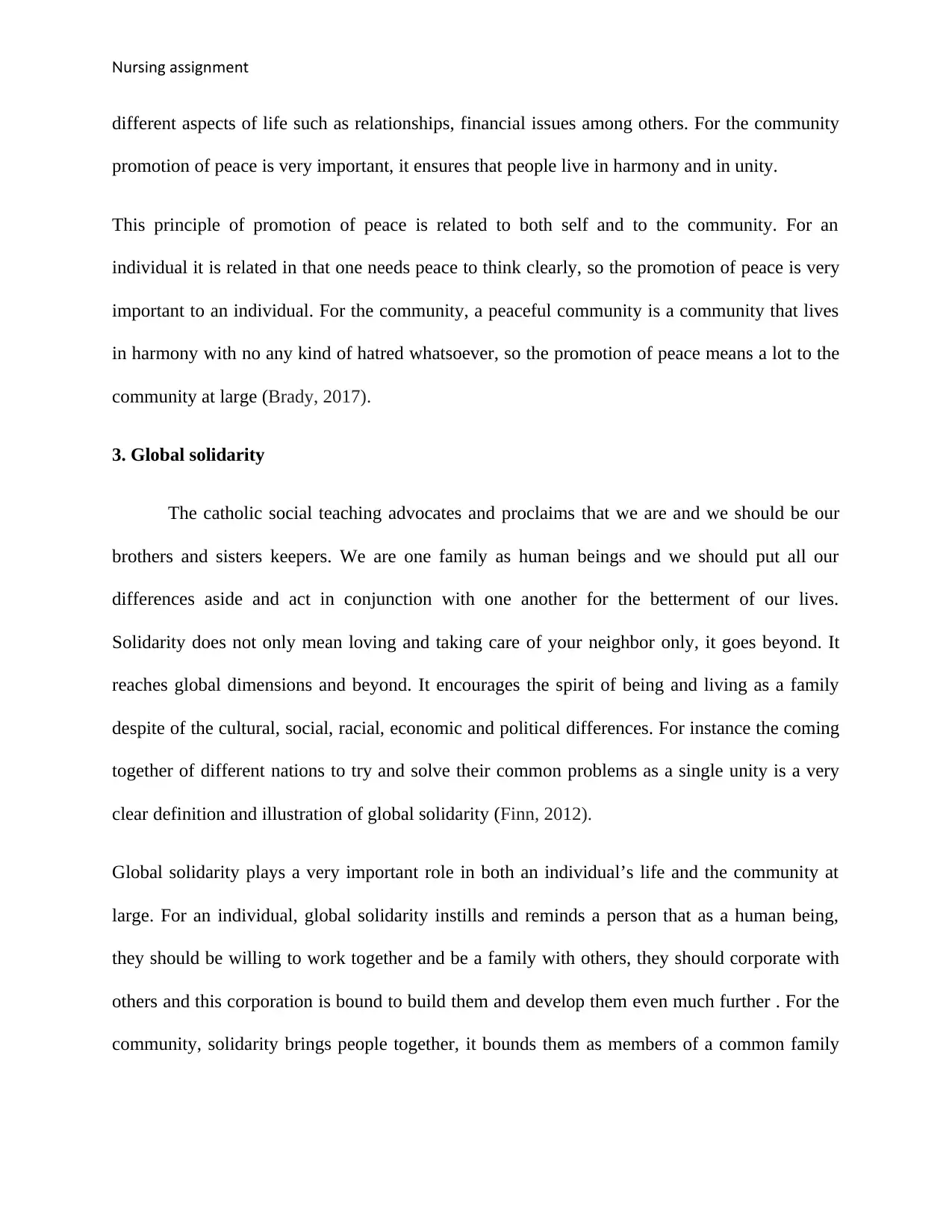
ursing assignmentN
different aspects of life such as relationships, financial issues among others. For the community
promotion of peace is very important, it ensures that people live in harmony and in unity.
This principle of promotion of peace is related to both self and to the community. For an
individual it is related in that one needs peace to think clearly, so the promotion of peace is very
important to an individual. For the community, a peaceful community is a community that lives
in harmony with no any kind of hatred whatsoever, so the promotion of peace means a lot to the
community at large (Brady, 2017).
3. Global solidarity
The catholic social teaching advocates and proclaims that we are and we should be our
brothers and sisters keepers. We are one family as human beings and we should put all our
differences aside and act in conjunction with one another for the betterment of our lives.
Solidarity does not only mean loving and taking care of your neighbor only, it goes beyond. It
reaches global dimensions and beyond. It encourages the spirit of being and living as a family
despite of the cultural, social, racial, economic and political differences. For instance the coming
together of different nations to try and solve their common problems as a single unity is a very
clear definition and illustration of global solidarity (Finn, 2012).
Global solidarity plays a very important role in both an individual’s life and the community at
large. For an individual, global solidarity instills and reminds a person that as a human being,
they should be willing to work together and be a family with others, they should corporate with
others and this corporation is bound to build them and develop them even much further . For the
community, solidarity brings people together, it bounds them as members of a common family
different aspects of life such as relationships, financial issues among others. For the community
promotion of peace is very important, it ensures that people live in harmony and in unity.
This principle of promotion of peace is related to both self and to the community. For an
individual it is related in that one needs peace to think clearly, so the promotion of peace is very
important to an individual. For the community, a peaceful community is a community that lives
in harmony with no any kind of hatred whatsoever, so the promotion of peace means a lot to the
community at large (Brady, 2017).
3. Global solidarity
The catholic social teaching advocates and proclaims that we are and we should be our
brothers and sisters keepers. We are one family as human beings and we should put all our
differences aside and act in conjunction with one another for the betterment of our lives.
Solidarity does not only mean loving and taking care of your neighbor only, it goes beyond. It
reaches global dimensions and beyond. It encourages the spirit of being and living as a family
despite of the cultural, social, racial, economic and political differences. For instance the coming
together of different nations to try and solve their common problems as a single unity is a very
clear definition and illustration of global solidarity (Finn, 2012).
Global solidarity plays a very important role in both an individual’s life and the community at
large. For an individual, global solidarity instills and reminds a person that as a human being,
they should be willing to work together and be a family with others, they should corporate with
others and this corporation is bound to build them and develop them even much further . For the
community, solidarity brings people together, it bounds them as members of a common family
Paraphrase This Document
Need a fresh take? Get an instant paraphrase of this document with our AI Paraphraser
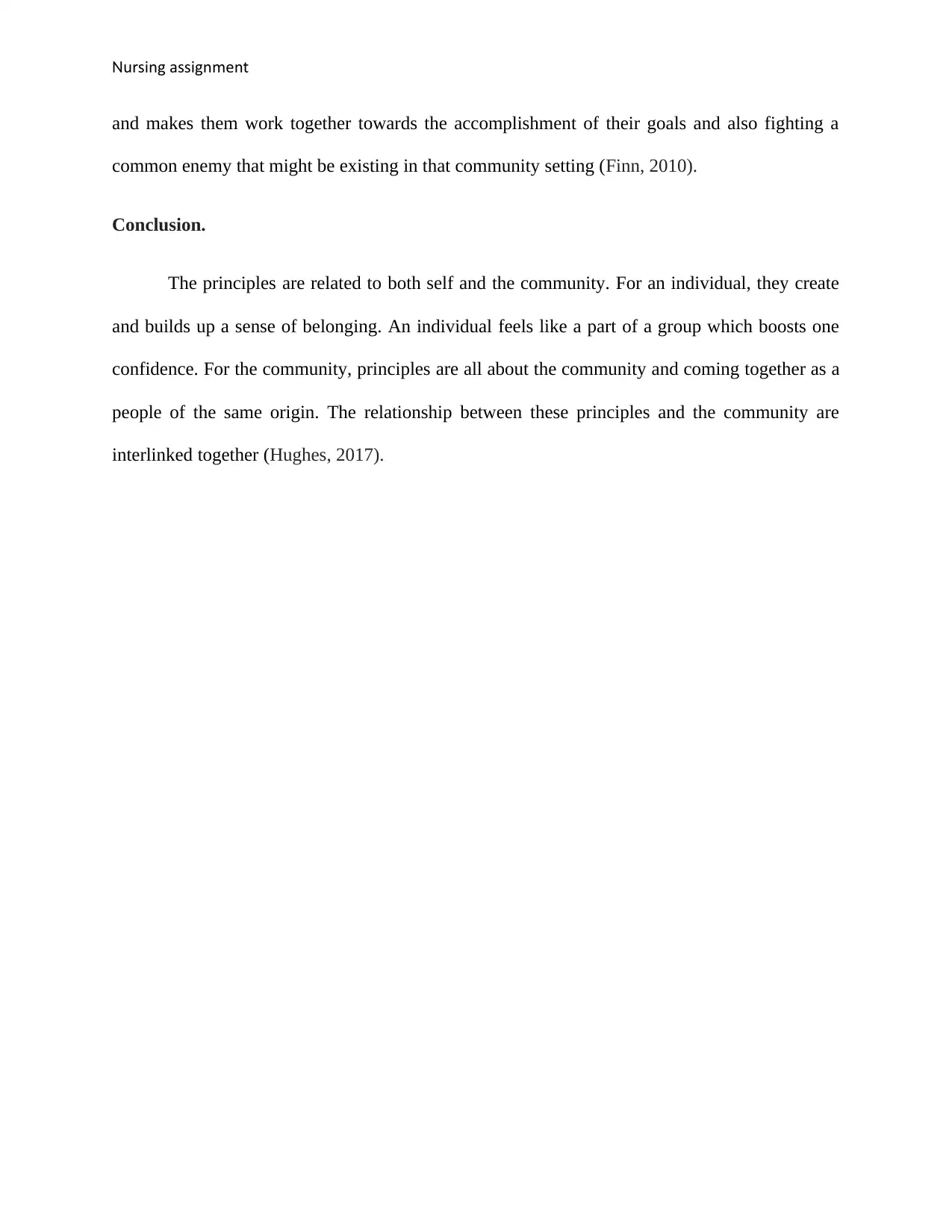
ursing assignmentN
and makes them work together towards the accomplishment of their goals and also fighting a
common enemy that might be existing in that community setting (Finn, 2010).
Conclusion.
The principles are related to both self and the community. For an individual, they create
and builds up a sense of belonging. An individual feels like a part of a group which boosts one
confidence. For the community, principles are all about the community and coming together as a
people of the same origin. The relationship between these principles and the community are
interlinked together (Hughes, 2017).
and makes them work together towards the accomplishment of their goals and also fighting a
common enemy that might be existing in that community setting (Finn, 2010).
Conclusion.
The principles are related to both self and the community. For an individual, they create
and builds up a sense of belonging. An individual feels like a part of a group which boosts one
confidence. For the community, principles are all about the community and coming together as a
people of the same origin. The relationship between these principles and the community are
interlinked together (Hughes, 2017).
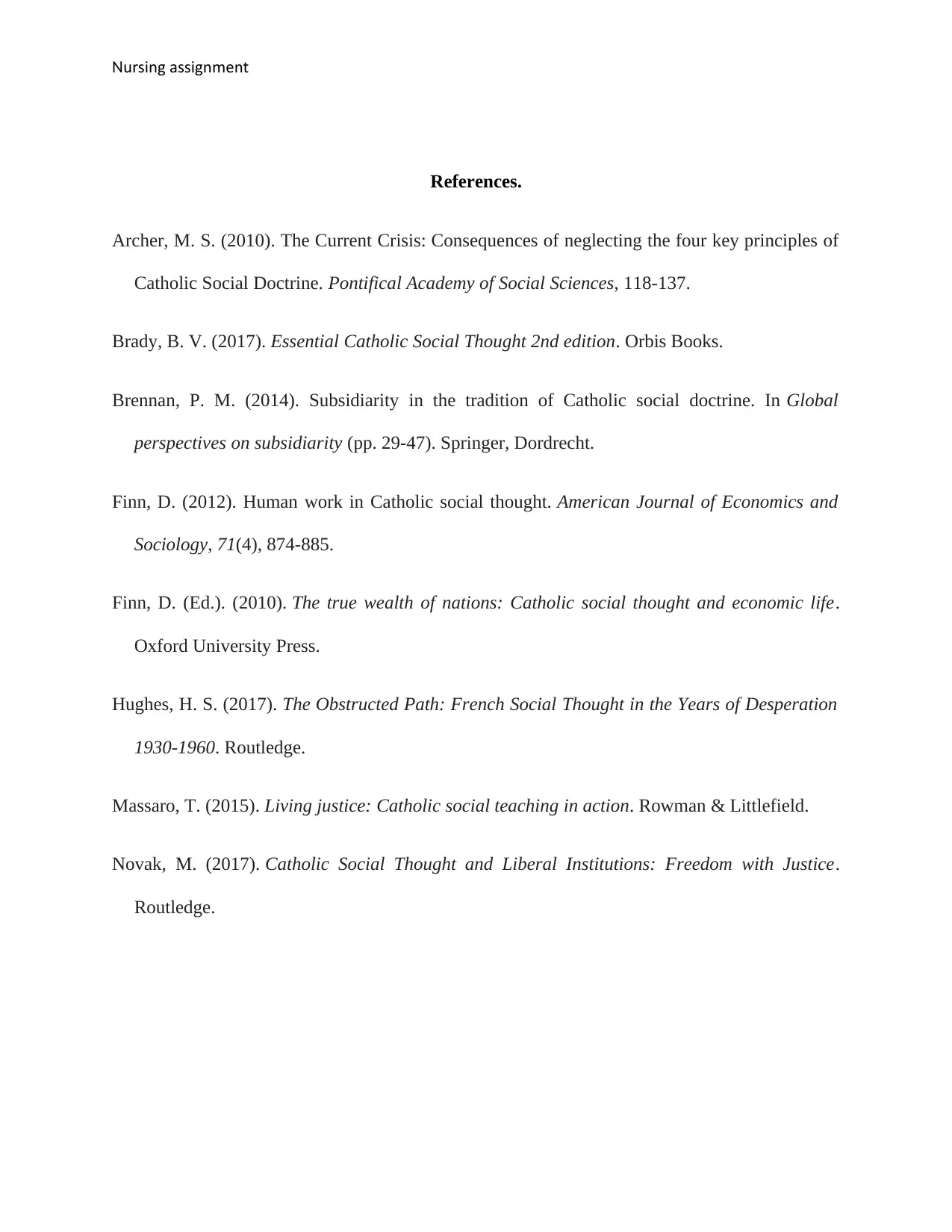
ursing assignmentN
References.
Archer, M. S. (2010). The Current Crisis: Consequences of neglecting the four key principles of
Catholic Social Doctrine. Pontifical Academy of Social Sciences, 118-137.
Brady, B. V. (2017). Essential Catholic Social Thought 2nd edition. Orbis Books.
Brennan, P. M. (2014). Subsidiarity in the tradition of Catholic social doctrine. In Global
perspectives on subsidiarity (pp. 29-47). Springer, Dordrecht.
Finn, D. (2012). Human work in Catholic social thought. American Journal of Economics and
Sociology, 71(4), 874-885.
Finn, D. (Ed.). (2010). The true wealth of nations: Catholic social thought and economic life.
Oxford University Press.
Hughes, H. S. (2017). The Obstructed Path: French Social Thought in the Years of Desperation
1930-1960. Routledge.
Massaro, T. (2015). Living justice: Catholic social teaching in action. Rowman & Littlefield.
Novak, M. (2017). Catholic Social Thought and Liberal Institutions: Freedom with Justice.
Routledge.
References.
Archer, M. S. (2010). The Current Crisis: Consequences of neglecting the four key principles of
Catholic Social Doctrine. Pontifical Academy of Social Sciences, 118-137.
Brady, B. V. (2017). Essential Catholic Social Thought 2nd edition. Orbis Books.
Brennan, P. M. (2014). Subsidiarity in the tradition of Catholic social doctrine. In Global
perspectives on subsidiarity (pp. 29-47). Springer, Dordrecht.
Finn, D. (2012). Human work in Catholic social thought. American Journal of Economics and
Sociology, 71(4), 874-885.
Finn, D. (Ed.). (2010). The true wealth of nations: Catholic social thought and economic life.
Oxford University Press.
Hughes, H. S. (2017). The Obstructed Path: French Social Thought in the Years of Desperation
1930-1960. Routledge.
Massaro, T. (2015). Living justice: Catholic social teaching in action. Rowman & Littlefield.
Novak, M. (2017). Catholic Social Thought and Liberal Institutions: Freedom with Justice.
Routledge.
⊘ This is a preview!⊘
Do you want full access?
Subscribe today to unlock all pages.

Trusted by 1+ million students worldwide
1 out of 6
Related Documents
Your All-in-One AI-Powered Toolkit for Academic Success.
+13062052269
info@desklib.com
Available 24*7 on WhatsApp / Email
![[object Object]](/_next/static/media/star-bottom.7253800d.svg)
Unlock your academic potential
Copyright © 2020–2026 A2Z Services. All Rights Reserved. Developed and managed by ZUCOL.




